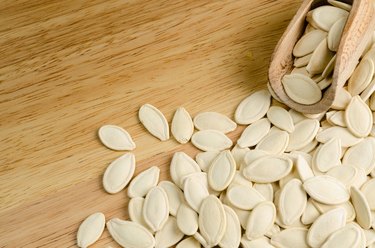
Pumpkin seed oil is a folkloric remedy for conditions such as irritable bowel syndrome, intestinal parasites and high cholesterol. The oil is also used as a carrier for massage and aromatherapy. According to the Ask Dr. Sears website, pumpkin seed oil is one of the most healthful oils because its contains 90 percent unsaturated fats as well as several fatty acids. Nonetheless, the oil has several dangers that warrant medical advice before incorporating it for specific conditions.
Hypotensive Effect
Video of the Day
The antioxidant properties of pumpkin seed oil may have a hypotensive, or blood pressure lowering, effect, altering the effects of hypertension medications, according to the journal Pharmacological Research. Researchers found that pumpkin seed oil enhanced the effects of anti-hypertension medications felodipine and captopril. Individuals on hypertension medications interested in using pumpkin seed oil should discuss risks and potential complications with their health-care provider.
Video of the Day
Prostate Effect
Pumpkin seed oil has not been proven as singularly improving benign prostatic hyperplasia, otherwise known as BPH, according to Beth Israel Deaconess Medical Center. Although research has shown a combined treatment of saw palmetto and pumpkin seed oil to be effective in treating BPH, the specific contributions of pumpkin seed oil are unknown, the hospital says. As a result, individuals should reconsider pumpkin seed oil as a stand-alone or sufficient treatment for BPH.
Quality Concerns
Pumpkin seed oil can spoil if not stored properly in a cool place, out of direct sunlight. The oil typically has a shelf life between six months to a year, according to Moksha Natural Products. However, heating destroys the nutritional properties of the oil, according to the Tried Tasted Served website. Moreover, due to the expense of harvesting pumpkin seeds and producing the oil, manufacturers commonly add cheaper sunflower or rapeseed oil to the products, according to researchers in the journal European Food Research and Technology. Adulterated pumpkin seed oils may have varying therapeutic effects or unintended side effects.
- Ask Dr. Sears: All About Oils
- Pharmacological Research: Pumpkin-Seed Oil Modulates the Effect of Feodipine and Captopril in Spontaneously Hypertensive Rats
- Beth Israel Deaconess Medical Center: Pumpkin Seed
- Moksha Lifestyle Products: Pumpkin Seed Oil
- Tried Tasted Served: Pumpkin Seed Oil
- European Food Research and Technology: Detection of Adulteration of Pumpkin Seed Oil